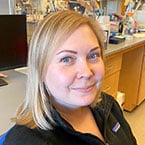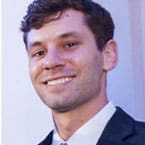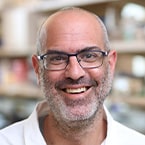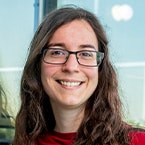AACR-AstraZeneca Cancer Research Fellowships
The AACR-AstraZeneca Cancer Research Fellowships represent a joint effort to encourage and support postdoctoral and clinical research fellows to conduct cancer research and to establish a successful career path in this field. Research projects may be basic, translational, clinical, or epidemiological in nature.
2023 Grantees

Research
Hormone receptor positive (HR+) breast cancer patients are usually treated with targeted therapies, including CDK4/6 inhibitors. Despite initial encouraging responses, tumors usually become resistant. In addition to intrinsic resistance that tumors develop, tumor-extrinsic factors, such as cancer-associated fibroblasts residing in the tumor microenvironment, also contribute to treatment-resistance. Dr. Hogstrom seeks to elucidate the function of CAF-secreted metabolites in stimulating treatment resistance to CDK4/6 inhibitors in HR+ breast cancer. To accomplish this, she has established a library of patient-derived organoid cultures and matching cancer-associated fibroblasts from primary and metastatic HR+ breast cancer.
Biography
Dr. Hogstrom received her doctorate at University of Helsinki in Finland, where she studied gene regulation in intestinal stem cells and colorectal cancer. After completing her graduate studies, she joined Beth Israel Deaconess Medical Center as a postdoctoral research fellow. Her research focuses on the metabolic interaction between the breast tumor and tumor microenvironment in HR+ breast cancer.
Acknowledgement of Support
“I’m truly honored to receive the AACR-AstraZeneca Breast Cancer Research Fellowship. This fellowship will help me advance my postdoctoral training in understanding how the tumor microenvironment influences treatment resistance and will be invaluable for my transition from a fellow to an independent investigator.”

Research
The risk of developing most cancers increases with age. Despite over 50% of breast cancer patients being over 60 years old, less than 20% of clinical trial enrollees fall in this age bracket. Further, most preclinical work is performed in young mice. Dr. Spasic’s preliminary data demonstrate that triple negative breast cancer (TNBC) progression and response to chemotherapy (paclitaxel) and immune checkpoint blockade (anti-PD-L1) is distinct between immunologically young and aged mice and is driven by age-associated differences in immune cells. Dr. Spasic proposes to use a novel DNA barcoding system to investigate clonal dynamics to uncover tumor intrinsic drivers of age-associated TNBC progression and manipulate interferon gamma signaling to direct immune cell function to improve responses to therapy.
Biography
Dr. Spasic received his undergraduate degree in bioengineering from the University of California, San Diego in 2012. He then completed his doctorate in 2018 in biomedical engineering at Columbia University, where he studied strategies to promote bone regeneration for the treatment of osteoporosis. Currently, Dr. Spasic is a postdoctoral fellow at Brigham and Women’s Hospital. Dr. Spasic’s research focuses on understanding how age impacts the immune system to dictate breast cancer progression and response to therapy.
Acknowledgement of Support
“Through the incredible support of this fellowship, I will have the ability to continue my work understanding how age impacts triple negative breast cancer progression and response to therapy to help us get closer to improving outcomes for all breast cancer patients.”
2022 Grantees

Research
Immune checkpoint blockade therapy (ICBT) has relatively limited use in breast cancer patients due to the lack of pre-existing immunity in the tumor microenvironment. Dr. Luo and her colleagues previously found that suppression of RNase activity of endoplasmic reticulum (ER) stress sensor IRE1a by IRE1 inhibitor ORIN1001, in combination with taxane, promotes immunogenic lytic cell death. In this project, Dr. Luo aims to elucidate how the ORIN1001/taxane combination induces inflammasome-dependent pyroptotic cell death, and to design a mechanism-based novel breast cancer immunotherapeutic strategy.
Biography
Dr. Luo received her PhD at the Institute of Biomedical Sciences (Fudan University, China), where she showed how Neutrophil Extracellular Traps (NETs) and cancer-associated fibroblasts fuel hepatocellular carcinoma (HCC) initiation and metastasis. She is currently a Postdoctoral Associate in the Department of Molecular and Cellular Biology at Baylor College of Medicine. Her long-standing interest has always been in cancer immunology and tumor microenvironment. She seeks to expand her research and training to breast cancer stress responses and immunotherapy, and aims to develop mechanism-based novel therapies to transform metastatic breast cancer into a manageable chronic disease.
Acknowledgement of Support
I am extremely honored to receive the 2022 AACR Breast Cancer Research Fellowship. This provides critical support for me as I seek to uncover the mechanisms behind how ORIN1001 and taxane convert PD-L1-negative immune-cold breast tumors to immune-hot ones. Also, this funding support sets me on the path towards an independent scientific career.

Research
Early-onset breast cancer (EOBC) is the most common cancer among young adult women. The incidence rates of EOBC are higher among Black compared to White individuals, and among people living in urban compared to rural areas. The impact of environmental exposures on EOBC risk is notably understudied. Dr. Phung and his colleagues are set to conduct a population-based case-control study in Michigan to examine the impact of environmental factors on EOBC risk, not only for the general population but also for different groups stratified by race/ethnicity and other social determinants of health. Environmental exposures of interest include personal-level factors (e.g., smoking, and pesticides) and location-related factors (e.g., air pollution, and metals). Given that many exposures are modifiable, this study has tremendous potential to identify EOBC primary prevention opportunities and improve health equity.
Biography
Dr. Phung obtained his master’s degree in public health from the University of Auckland, and his doctoral degree in epidemiology from the University of Michigan. His masteral thesis work was focused on the development of a risk prediction model for breast cancer survival in New Zealand. In his doctoral training, he formulated a risk stratification model for precision prevention of ovarian cancer. He is currently a postdoctoral fellow at the University of Michigan, where he continues his breast cancer and ovarian cancer research emphases.
Acknowledgment of Support
I am extremely honored to receive the AACR-AstraZeneca Breast Cancer Research Fellowship. This fellowship will advance my research and goal to become an independent researcher in cancer epidemiology. This fellowship will also provide opportunities to build a foundation in research on environmental factors and early-onset breast cancer.

Research
Despite the striking success of anti-PD-1/PD-L1 antibodies, most patients do not respond to PD-1 blockade, and many experience immune-related adverse events. Clearly, the need for therapeutics that go beyond interference with ligand binding is critical. By utilizing mass-spectrometry data and tumor models, the kinase VRK2 was established as a downstream mediator of PD-1. With a long-term goal of developing clinically useful VRK2 inhibitors, Dr. Lerrer is set to define the roles of the kinase domain and protein/protein-interaction domain of VRK2 in mediating PD-1 functions, and uncover the inhibitory roles of VRK2 in different T cell subsets.
Biography
Dr. Lerrer obtained his doctoral degree from the Faculty of Life Sciences of Tel Aviv University, where he studied the inflammatory phenotype and pro-malignant functions of mesenchymal stem/stromal cells (MSC) in the context of the breast tumor microenvironment. Currently a postdoctoral research scientist, he is studying the basic mechanisms underlying PD-1 signaling and functions in T cells, with the anticipation that a better understanding of PD-1 biology will allow for better treatment of cancer patients.
Acknowledgment of Support
My long-term goal is to develop VRK2 inhibitors that will be clinically useful to overcome resistance against current PD1 inhibitors. The AACR-AstraZeneca Immuno-oncology Research Fellowship will allow me to further establish VRK2 as a target, while expanding my skills and knowledge in the field of cancer immunology.

Research
Homologous recombination (HR) DNA repair deficiency is a frequent event in ovarian cancer (OC). While PARP inhibitors (PARPi) are effective targeted drugs for HR-deficient OC, most women eventually stop responding. A comprehensive understanding of mechanisms of PARPi action and resistance are critical to improving outcomes for women with OC. To address this, Dr. Nesic is using genome-wide CRISPR screens to identify both novel PARPi resistance mechanisms and PARPi synergy targets in OC cell line models with different HR defects. Validated screen hits will be explored in vivo using a highly characterized cohort of OC patient-derived xenograft models.
Biography
Dr. Ksenija Nesic graduated with a Bachelor of Science from the University of Melbourne in 2012 and went on to complete a master’s degree with Professor David Thorburn at the Murdoch Children’s Research Institute (Melbourne, Australia), where she developed a sequencing-based test for mitochondrial DNA mutations in children with mitochondrial disease. She completed her PhD in at WEHI (Melbourne, Australia), where she studied diverse mechanisms of PARP inhibitor resistance in ovarian cancer PDX and cell line models. She is continuing this work as a postdoctoral researcher.
Acknowledgment of Support
The AACR-AstraZeneca Ovarian Cancer Research Fellowship is giving me the opportunity to complete fundamental research started during my PhD, that has the potential to improve outcomes for many women diagnosed with ovarian cancer. I am extremely grateful for the support that this fellowship provides, and excited about the research to come.

Research
Ovarian cancer is the most lethal gynecologic malignancy. Despite its immunogenic nature, response rates to immune checkpoint blockade monotherapy are low. Patients with Homologous Recombination Deficiency (HRD), whose tumors display higher infiltration by T cells, do not experience a significant response to anti-PD-1 treatment. Dr. Salvioni’s colleagues previously identified two populations of antigen-specific exhausted CD4 and CD8 T cells that play key roles in the response to anti-PD-1 treatment in epithelial malignancies. By characterizing these populations in ovarian cancer samples with different HRD status, Dr. Salvioni aims to elucidate how HRD shapes the immune landscape of tumors.
Biography
Dr. Salvioni completed her Pharmacy training at the University of Padua, Italy, and her doctoral degree at Paul Sabatier University in Toulouse, France. Her doctoral research, both in Toulouse and at the University of California Berkeley, as a visiting student, focused on adaptive immunity mechanisms in host-pathogen interactions. She is currently a postdoctoral researcher at the University Cancer Institute of Toulouse Oncopole and the Cancer Research Center of Toulouse. She is focused on characterizing the impact of homologous recombination deficiency on T-cell exhaustion in ovarian cancer, laying the groundwork for efficient combination therapies that can help overcome resistance to immunotherapy.
Acknowledgement of Support
I am honored and grateful to be a recipient of the AACR-AstraZeneca Ovarian Cancer Research Fellowship. This grant provides an invaluable opportunity to study the influence of homologous recombination deficiency on T-cell exhaustion in ovarian cancer. This support is pivotal for my path towards being an independent researcher in onco-immunology.